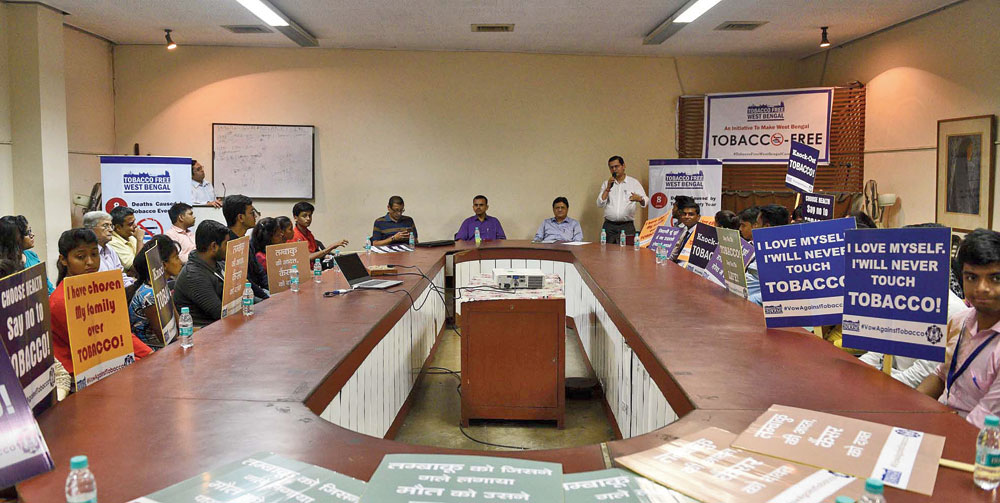An audio-visual campaign against passive smoking — “Dada, aapnar dhnowa ta aapnar kachhei rakhun (brother, keep your smoke to yourself)” — that became popular in the 90s needs a rerun after a couple of decades as some habits die hard.
A 24-year-old woman had objected to a man smoking in the bus as an expecting woman was travelling in it. Brushing aside the objection, the man said: “So what? It’s not a crowded bus and the smoke is going out of the window.”
According to the Global Adult Tobacco Survey (GATS 2), 2016-17, report published by the Union ministry of health and family welfare, 22.5 per cent of all adults in Bengal were exposed to second-hand smoke at any public place.
At a programme held on Friday, students and young people narrated how they involuntarily became passive smokers while using public transport and on the streets of Calcutta.
They questioned why the Cigarettes and other Tobacco Products (Prohibition of Advertisement and Regulation of Trade and Commerce, Production, Supply and Distribution) Act, 2003, (Cotpa) was not being enforced strictly in the city.
An organisation campaigning for “Tobacco-free West Bengal” had invited over 50 students and young people aged between 15 and 25 years for a panel discussion to sensitise them on the ill-effects of tobacco and desist them from smoking.
“There have been occasions when I have objected to people smoking in a bus but those who smoke are not bothered about others. In most of the cases, they continue to smoke and instead of being apologetic they pick a quarrel,” said Pooja Mandal, a student attending the event.
Insisting on the implementation of Cotpa, oncologist Gautam Mukhopadhyay said: “There have been awareness programmes for decades but at some point implementation is necessary.”
Mukhopadhyay, who is the secretary of Bengal Oncology Foundation that works on cancer awareness and a patron of Voice of Tobacco Victims, a national NGO, spoke on how nine out of the 10 oral cancer cases were a result of tobacco use in some form or the other. While addressing the students on the ill-effects of tobacco, he urged them not to consume tobacco in any form.
“I have seen people who smoke at the age of 25-26, quit after a few years. But by the time they quit, many of them had got cancer.
As far as cancer is concerned, quitting does reduce the chances of cancer but does not remove it completely,” he said.
The programme manager of the campaign, Indranil Dasgupta, said it was important to sensitise students and young adults so that they did not pick up the habit.
“We are working with police and the health department for a stricter enforcement of Cotpa,” he said.
Police sergeant of Swami Vivekananda Police Academy, Biswanath Mukherjee, said there had been a change because initially people didn’t know there was any such a law.
“Smoking cigarette in your house or backyard is not illegal, but doing it in public makes it illegal,” he said. The young participant appealed to the authorities to penalise those selling cigarettes and other tobacco products within 100 yards of an educational institute.










